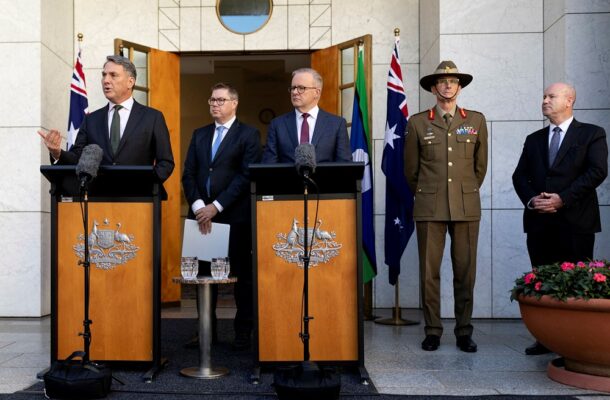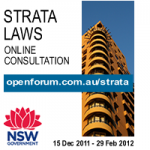Our dangerous times are driving an unprecedented tempo of strategy writing in Canberra. Having barely caught its breath since the AUKUS pathway announcement in March and the release of the defence strategic review (DSR) in April, the Defence Department will already be sketching the outline of the national defence strategy (NDS), to be published next year and updated every two years.
Complementing the NDS are strategies or reviews in the pipeline on defence industry, the future of the navy’s surface fleet, the Australian Defence Force Reserves, and a smorgasbord of other issues.
But this is not Defence’s burden alone. Fleshing out the concept of national defence will shape the agendas of the National Security Committee of cabinet and interdepartmental committees for months. Deft statecraft, drawing on all our national levers of power, will be required to assure and encourage allies and partners, counter disinformation and manage the signals sent to China and other strategic competitors.
And this is not just about government. As the DSR makes clear, national defence requires all-of-nation delivery. That means bringing along industry, the media and the public at large. It also means a crucial role for parliamentary debate and scrutiny.
Senate estimates hearings this month will help gauge cross-party confidence in the national defence concept and the resources that Treasurer Jim Chalmers has allocated to deliver it. Other parliamentary committees can’t compete with the spectacle of estimates, but their assiduous work on these topics is important and shouldn’t be overlooked.
Later today, the Joint Standing Committee on Foreign Affairs, Defence and Trade will hold its first public hearing in its inquiry into the 2021–22 Defence annual report. The inquiry’s title doesn’t set the blood racing, and the committee has received submissions from only a small number of organisations and individuals. We are proud to be among them.
Far from being a historical audit, these hearings are an opportunity to grapple with some of the most pressing challenges in national defence: how to get the right workforce in the defence organisation, how to develop Australia’s space capabilities, and what role Defence and the ADF should play in national crises.
The department will inevitably be the focus of this inquiry because its annual report is under the microscope. But the committee should avoid bureaucratically Balkanising these issues; effective national defence cannot be delivered by Defence alone.
Recruiting and retaining enough people with the right skills is the biggest national defence challenge Australia faces.
Defence plans to grow its workforce by around 30% by 2040, yet the ADF shrank in 2021–22 because of recruitment shortfalls and a high separation rate. Beyond the regular military, Defence is also short of public servants, which conflicts with political pressure to reduce the use of contractors, and reservists and veterans are not being deployed to greatest effect. This is all complicated by the niche skills required for delivering the AUKUS initiatives, implementing the DSR and strengthening the sovereign defence industrial base.
There are no easy answers to the workforce conundrum. The DSR makes steps in the right direction by securing government approval for a review of the reserves, the appointment of a new chief of personnel reporting to the chief of the ADF, and tackling lags between applications and recruitment.
Importantly, the government will consider adjusting ADF recruitment criteria for key specialist areas, like cyber and space. This is a welcome move, but one that requires careful handling to protect the ADF’s esprit de corps. The stereotype of computer gamers becoming Defence’s cadre of keyboard warriors is misleading.
The modern, multi-domain battlefield requires high-tech skills on the front line, not just behind the lines, and the discipline required for commanding and soldiering doesn’t change. A key focus should be modernising the system for rapid but reliable security vetting, accepting that the young people needed to implement the DSR and AUKUS will have more diverse backgrounds and experiences than the current system accommodates.
Complementing these initiatives, Defence could go further by comprehensively reviewing its organisational structure, potentially alleviating some of the pressure to grow the workforce by leveraging technology, streamlining processes and redeploying personnel. The review of the reserves should consider expanding roles that can be filled by people joining straight from civilian life, rather than relying on veterans—an area in which the army is doing far better than the navy and air force.
Defence could also support diversity and inclusion by publishing more data on career pathways into senior positions. The aggregate data on gender diversity in Defence’s annual report misses how men still dominate certain career specialisations that provide more ready pathways to star ranks. Examples include the navy warfare officer role, which offers the surest pathway into key positions, like fleet commander or head of navy capability, that are yet to be filled by female officers.
The second focus of the committee’s inquiry is space capability—a priority encapsulating the interconnected challenges of workforce, industrial policy and international partnerships, which have implications both for and beyond defence.
The establishment of Defence Space Command last year was an overdue recognition that space is a critical operational domain that cannot be treated ad hoc as an extension of air operations.
The integrated and focused force called for in the DSR—one that reinforces deterrence and expands long-range precision strike—cannot function without access to and capability in space. Space assets are vulnerable to a growing range of weapons, which China, Russia and others are investing in, including some, like cyberattacks, that could be used with stealth and deniability before Australia is clearly at war.
But acknowledging Australia’s vulnerability shouldn’t mean surrendering access to space. Improving the resilience of space assets and deploying counter-space capabilities is essential for deterrence. If deterrence fails, maintaining the manufacturing and launch capability to replenish space assets could be decisive in a conflict. These points must be recognised in the NDS.
Australia has the means to develop the space capability it needs. Our nascent commercial space sector is world class in its areas of competitive advantage, including exploiting Australia’s proximity to the equator for cost-efficient launch, which Defence already benefits from. Defence Space Command should work with the Australian Space Agency and the commercial space industry to develop a focused, sovereign defence capability in space that’s suited to our strategic requirements.
However, building a sovereign capability doesn’t mean going it alone. Focusing on niche capabilities and leveraging trusted partnerships is vital for success. But relying on the US alliance for access to space is no longer an option. Developing a sovereign space capability improves confidence that space assets will be there when Australia needs them. It also elevates Australia’s contribution to regional stability and the US alliance by supporting more effective joint and combined operations.
The last area of focus for the committee’s inquiry is Defence’s support during national crises. The ADF has a long and proud history of providing disaster relief, which the public and politicians have come to expect. But that burden is increasing with climate change while the ADF must focus on deterring China.
We’re heartened that the government has agreed in principle to the DSR recommendation that the Commonwealth, states and territories must build their civilian capacity to tackle all but the most extreme domestic effects of climate change. What shape that takes will reflect a cross-departmental scoping study that Home Affairs is leading.
But if the DSR is any guide, it seems unlikely that the ADF will be reorganised to have a portion of the force dedicated to disaster relief, while the remainder focuses on deterrence and warfighting. That seems impracticable given the potential damage to the ADF’s sense of unitary purpose and morale, as well as possible resistance to implementation.
As ASPI’s Robert Glasser has pointed out, one option for building civilian capacity could be stand-by arrangements to release government employees from their day jobs to scale up the Commonwealth’s emergency response. As the bushfire royal commission noted, constitutional questions may also need to be addressed if the leading role afforded to states and territories in disaster response changes.
Even with a more substantial civilian capability, Defence is far from off the hook. As the department’s own submission to the inquiry highlighted, ADF reservists often also have non-military first-responder responsibilities, which has had an impact on the Army’s 2nd (Reserve) Division. The review of reserves announced in the DSR is an opportunity to take proper stock of the size of the volunteer workforce, addressing double-counting across rural fire services, state emergency services and the like, but action is also needed before that review is due to report in 2025.
Even as the ‘force of last resort’ advocated in the DSR, the ADF risks being frequently called upon for humanitarian assistance and disaster relief as climate change accelerates. And beyond Australia’s shores, the ADF’s responsibilities in the Pacific look certain to ramp up as the effects of climate change dovetail with Chinese opportunism.
This becomes a truly wicked problem when we acknowledge that coercive states may exploit natural disasters for malign activities, including interrupting access to reliable information, potentially as cover for opportunism elsewhere. Beijing’s conduct during the Covid-19 pandemic, which included spreading disinformation as well as coercion against India and others, is instructive here.
In these hybrid types of national crises, there will be a role for police and security agencies in countering malign actors while civilian agencies lead on disaster response. Defence’s threshold for involvement should be high to ensure it remains focused on what the DSR calls ‘the highest level of strategic risk we now face as a nation: the prospect of major conflict in the region that directly threatens our national interest’.
Defence’s workforce, space capabilities and role in national crises are weighty issues that go to the heart of national defence. Parliamentary scrutiny in hearings like today’s helps build support among lawmakers and the public. But some aspects of national defence are not suited to open formats that may be monitored by potential adversaries.
This has long been recognised in the intelligence world, and is why the Parliamentary Joint Committee on Intelligence and Security has a statutory responsibility to consider classified evidence behind closed doors. This is an increasingly stark problem in defence given our deteriorating strategic environment and the discretion our partners expect around initiatives like AUKUS.
In March 2023, the Foreign Affairs, Defence and Trade Committee recommended legislation to set up a joint statutory committee on defence to address the dual requirements of oversight and discretion. Like the Intelligence and Security Committee, it would have the powers and facilities to handle classified information, including some intelligence briefings. But, as with intelligence and security, that sparks questions about the membership of such a sensitive committee.
The case for creating a new parliamentary committee that could hold sessions in camera is strong but must be weighed against the public interest and communication benefits of open hearings. Further thinking is also required to ensure that any new parliamentary committee is focused on national defence, not just the Defence Department, accompanied with the remit to hear evidence from across government.
Done right, the scrutiny and consensus-building that such a parliamentary committee would provide could help build public understanding and consent for the adjustments to everyday life that national defence will require across peacetime and wartime. Honesty with the Australian public should not be mistaken for scaremongering.
Finding the magic formula for putting parliament at the heart of building national defence is an urgent task, but also one that mustn’t be botched by hurrying. For now, we encourage you to tune in to the inquiry’s hearings as food for thought.
This article was written by Bec Shrimpton, the director of defence, strategy and national security at ASPI; Alex Bristow, the deputy director of strategic policy at ASPI; Jennifer Parker, the deputy director of defence at ASPI; and Malcolm Davis, a senior analyst at ASPI. It draws on the authors’ joint submission to the Joint Standing Committee on Foreign Affairs, Defence and Trade. It was published by The Strategist.














